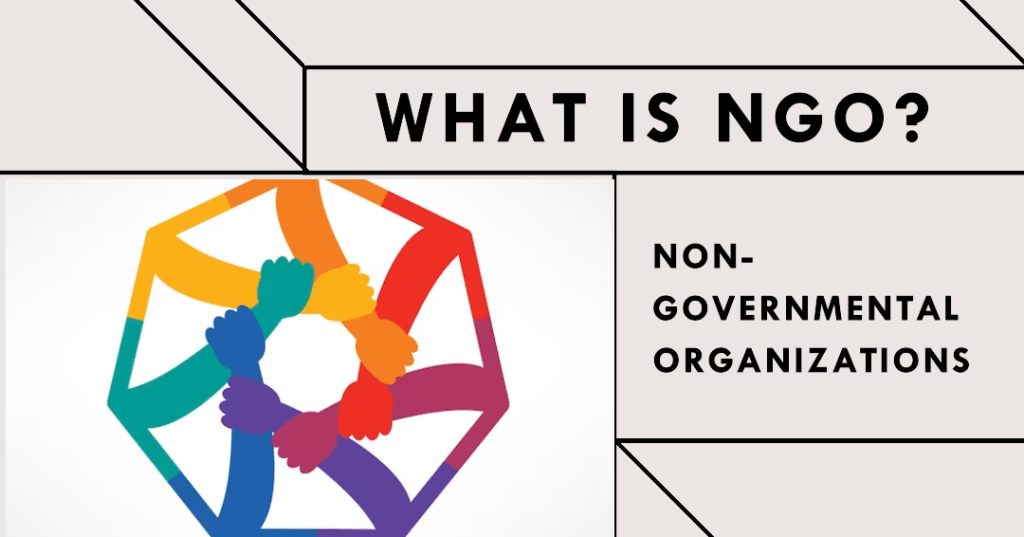Summarize this Article with:
NGO Full Form: A Comprehensive Guide to Non-Governmental Organizations

Non-governmental organizations (NGOs) are organizations that operate independently from governments and are primarily driven by the desire to address various social, economic, and environmental issues. The term “NGO” stands for Non-Governmental Organization, which reflects the fact that these organizations are not affiliated with any government agency or political party.
NGOs are important in society because they fill gaps left by the government, provide support and relief to vulnerable populations, and advocate for social causes, environmental causes, and human rights. In this article, we will delve into the what is NGO and importance of NGOs and take a brief look at their history.
What is an NGO
NGO stands for Non-Governmental Organization. It is a non-profit organization that operates independently of any government and aims to address social, cultural, educational, health, or environmental issues. NGOs work towards the betterment of society by promoting various causes and providing services to disadvantaged or marginalized communities.
NGOs are usually established by a group of individuals, organizations, or a combination of both, who come together to address a particular issue or cause. They may be involved in a variety of activities, such as advocacy, research, education, and direct service delivery. NGOs may receive funding from private individuals, corporations, or government agencies, but they are not directly affiliated with any government.
Some well-known NGOs include Amnesty International, Greenpeace, World Wildlife Fund, and Doctors Without Borders. They operate at the local, national, and international levels and play an important role in addressing social and environmental issues that may not be adequately addressed by governments or the private sector.
Understanding the Full Form of NGO
The term NGO stands for Non-Governmental Organization. This term describes organizations that operate independently of government control or funding. NGOs can be established for a variety of reasons, but they are generally motivated by a desire to address social, economic, and environmental issues. NGOs can work at the local, national, or international level, and range in size from small community-based organizations to large international organizations.
Types of NGOs
Non-Profit NGOs: Non-profit organizations are those that do not exist to make a profit. They exist to deliver a certain service or benefit to society. Non-profit organizations (NGOs) can work in a range of fields, including education, health, and social services. Charitable organizations, community organizations, and faith-based organizations are examples of non-profit NGOs.
Social Cause NGOs: Social cause NGOs are non-governmental organizations that work to address a specific social issue or concern. These organizations aim to raise awareness about the problem, lobby for policy changes, and give services or support to people impacted by it. Social purpose NGOs can address a wide range of issues, such as poverty, homelessness, domestic abuse, and educational access.
Environmental Cause NGOs: Environmental non-governmental organizations (NGOs) conserve and preserve the environment. These organizations seek to increase environmental awareness and fight for policy changes that safeguard the environment. They also provide information and tools to assist people and communities in reducing their environmental impact. Greenpeace, the Sierra Club, and the World Wildlife Fund are examples of eco-related non-governmental organizations.
Human Rights NGOs: Human rights non-governmental organizations (NGOs) strive to defend and promote human rights worldwide. These organizations aim to raise awareness about human rights violations, lobby for policy reforms that defend human rights, and give assistance and resources to persons who have been victims of human rights breaches. Human rights non-governmental organizations (NGOs) include Amnesty International, Human Rights Watch, and the International Commission of Jurists.
Importance of NGOs
Filling Gaps Left by Government: One of the main responsibilities of non-governmental organizations (NGOs) is to fill gaps left by government organizations or institutions. Governments may lack the necessary resources, ability, or political will to handle certain social, economic, and environmental concerns. Non-governmental organizations (NGOs) are typically better positioned to solve these difficulties because they are more adaptable, imaginative, and sensitive to local requirements. NGOs may help communities that might otherwise have been ignored or neglected by the government by providing crucial services and assistance.
Providing Support and Relief to Vulnerable Populations: NGOs play an important role in providing assistance and relief to disadvantaged communities, especially during times of crisis or catastrophe. During catastrophes, wars, or humanitarian crises, non-governmental organizations (NGOs) are frequently the first responders, offering crucial services such as food, shelter, and medical treatment. NGOs also seek to address the long-term needs of vulnerable groups, such as providing education and healthcare, assisting refugees and displaced people, and assisting individuals living in poverty or with disabilities.
Advocacy and Awareness-Raising: NGOs are also key change agents, raising awareness about social, economic, and environmental challenges and campaigning for legislative reforms to solve them. NGOs may provide groups with a voice marginalized or excluded from decision-making processes. Non-governmental organizations (NGOs) also aim to hold governments and other institutions responsible for their acts, as well as promote transparency and effective governance. NGOs may affect long-term and sustainable change in communities and society as a whole through increasing awareness and pushing for legislative reforms.
Overall, NGOs play a significant role in promoting social justice, human rights, and sustainable development. They provide critical services and assistance to disadvantaged groups, lobby for legislative changes, and try to close gaps created by governments and other organizations. NGOs are a powerful force for social change and advancement, and their work is critical to a fairer and more equal world.
Challenges Faced by NGOs
Funding: One of the most difficult issues for NGOs is obtaining funds for their activities. Many non-governmental organizations (NGOs) rely on contributions and grants to sustain their operations, which can be unexpected and inadequate. Furthermore, funding might be limited to specific programmes, limiting an NGO’s capacity to address larger concerns.
NGOs seek out several donors, request grants from various organizations, and organize fundraising events to solve financing issues. Non-governmental organizations (NGOs) earn money selling items or services linked to their objectives, such as fair-trade goods or eco-tourism experiences.
Political Interference: NGOs can face political interference from governments or other organizations that disagree with their mission or methods. This interference can take many forms, such as legal restrictions on NGO activities, harassment of staff or supporters, or defamation campaigns aimed at discrediting the NGO.
To deal with political interference challenges, NGOs may engage in advocacy efforts to promote their cause and build support among key stakeholders. They may also seek out legal support to challenge restrictive laws or regulations. Some NGOs form coalitions with other organizations to amplify their voices and increase their influence.
Sustainability: Many NGOs struggle with sustainability since they rely on short-term financing and donor assistance to operate. This might make long-term programmes and activities difficult to organize and administer. Furthermore, the change of personnel and volunteers might make it difficult to preserve continuity and institutional expertise.
To guarantee sustainability, NGOs may focus on developing local alliances and capacity-building projects that lead to self-sufficiency over time. They may also priorities the recruitment and retention of long-term personnel and volunteers, as well as undertake succession planning techniques to assure leadership continuity. Finally, NGOs may invest in technology and systems that streamline operations and decrease expenses in the long run.
conclusion
NGOs have an important role in tackling social, economic, and environmental issues. However, they face significant obstacles such as funding, political interference, and sustainability. To overcome these challenges, NGOs must be strategic, and innovative, and seek out diverse funding sources. They must also build local partnerships and invest in technology and systems.
Supporting NGOs is essential to creating a more just and equitable world, as they fill gaps left by governments, provide support to vulnerable populations, and raise awareness about significant issues. By supporting NGOs, we can create positive change and make a meaningful impact in our communities and the world.
Hey, how much did you like NGO Full Form: A Comprehensive Guide to Non-Governmental Organizations Please share your view in the comment box. Also, please share this story with your friends on social media so they can also enjoy it, and for more such Full form, please bookmark storiespub.com.
FAQ’s
What is an NGO?
An NGO, or non-governmental organization, is a non-profit entity that operates independently from government or business interests to pursue a social or environmental cause.
What is the difference between a non-profit organization and an NGO?
NGOs and non-profit organizations are similar in that they are both non-profit entities. However, NGOs typically operate independently from government or business interests, while non-profit organizations may receive funding or support from these entities.
What causes do NGOs typically focus on?
NGOs may focus on a wide range of causes, including human rights, environmental protection, poverty alleviation, and education.
How do NGOs fund their operations?
NGOs may receive funding from individual donors, grants from foundations or governments, corporate sponsorships, or revenue from sales of products or services related to their mission.
How can I support an NGO?
You can support an NGO by donating money or time, advocating for their cause, or purchasing products or services related to their mission.














